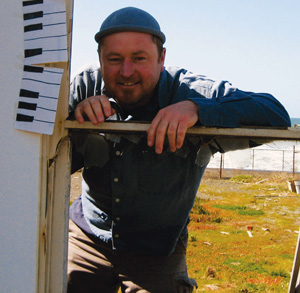

The only homeless musician with two degrees from SJSU’s School of Music is now a published essayist. The only San Jose native to record on Claude Debussy’s old piano in Brive-la-Gaillarde, France, the only one to cut a CD with William Parker and Nels Cline and also lock himself in a house with Mike Watt of fIREHOSE, has contributed to a landmark collection of writings: Anthology of Essays on Deep Listening, (Deep Listening Publications, $25).
Twenty years ago, pianist Thollem McDonas probably could have had a concert career. After graduating with degrees in both piano performance and composition, he could have donned a tuxedo and plied his trade in the world’s greatest concert and performance venues.
Instead, McDonas decided to expound energy in grass-roots political and ecological movements. At that time, everyone thought he was bonkers for squandering his potential.
Thankfully, about eight years ago, McDonas returned to music with full focus and everyone still thought he was bonkers. After all, who could spend a life traveling and also be diverse enough to teach improvisation workshops in Mexico, play keys with political-punk bands in Italy and write essays alongside renowned contemporary composers? Who could possibly survive crisscrossing the Atlantic every year, performing in theaters, art galleries, elementary schools, concert halls, jazz clubs, festivals, warehouses, gardens, gutters, prisons and riots—and on television, radio and the Internet?
Yet this is what McDonas does. Today, with no permanent roof over his head, McDonas is experiencing a detonation of notoriety. A “peripatetic musician,” this critically acclaimed pianist has, just in the last few months, released The Gowanus Session with jazz legend William Parker and Wilco guitarist Nels Cline.
He also spent a weekend locked in a boiling hot Texas house with Mike Watt, John Dieterich and Tim Barnes to bang out yet another CD, You Are Always on Our Minds, calling the group The Hand to Man Band. In the last eight years, McDonas has added 24 albums to his discography on 20 different vanguard record labels in four different countries. Legendary composer Terry Riley even wrote the liner notes for the music McDonas cut using Debussy’s old piano, in partnership with the late contrabass virtuoso Stefano Scodanibbio.
What’s more, McDonas also just penned an essay, “Deep Listening and the Peripatetic Life of an Improvising Musician,” included in the above-mentioned anthology. His journey is an unlikely, but inspiring one.
“Perpetual travel enlightens both the traveler as well as those with whom they come into contact,” McDonas writes. “I believe that traveling musicians/artists/creative and free thinkers are necessary as nongovernmental cultural ambassadors, because they represent their communities and countries and fill an important role as artist liaisons in the relations between diverse peoples.”
“Deep listening,” a philosophy originally developed by the pioneering 20th-century composer Pauline Oliveros, weaves Buddhist mindfulness with enhanced musical improvisation skills, distinguishing the difference between the involuntary nature of hearing and the voluntary selective nature of listening. One becomes aware of all sounds—musical, environmental, social—in order to develop a heightened sense of awareness.
In the book, the philosophy is applied to numerous contexts. McDonas, for instance, relates it to the life of a nomadic musician, constantly ingesting unfamiliar sonic palettes wherever he roams, merging them with the creative musical ideas already inside his head. A heightened awareness of constantly changing environmental sounds affects how he improvises onstage, no matter in which country he finds himself.
“The experience of being in physical motion encourages my mind to stay in motion as well,” he writes. “I’m exposed to unique sounds in diverse environments that continually inform the way I hear and interact. I experience the unknown sometimes around every corner, encouraging me to keep extra aware of my surroundings and therefore putting me into a continual state of nonhabit. I feel the direct connection of the flow of my body through space with the flow of ideas through my mind as new experiences are constantly stimulating new ideas.” Hail Spartans, hail!



